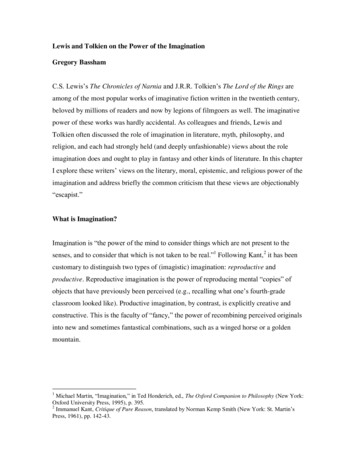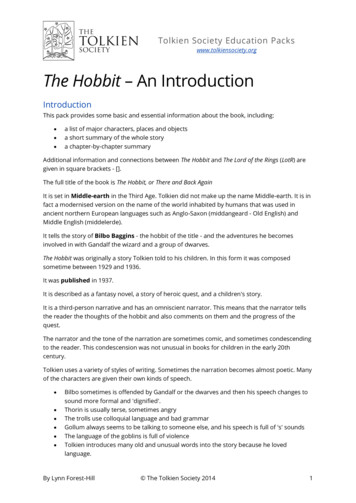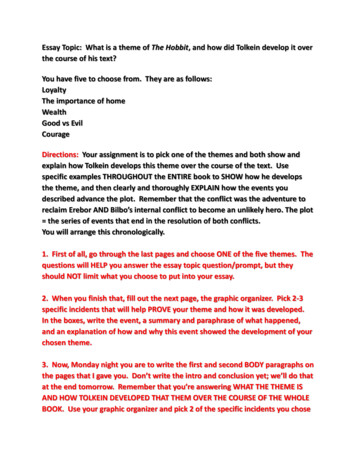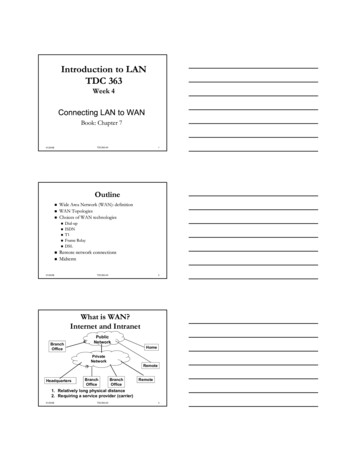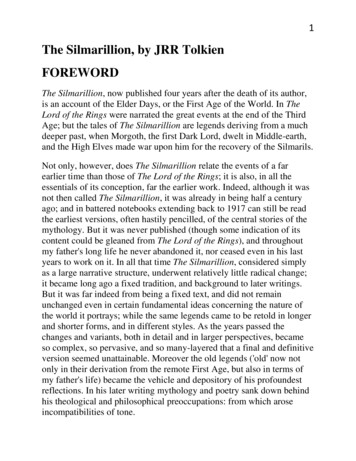
Transcription
1The Silmarillion, by JRR TolkienFOREWORDThe Silmarillion, now published four years after the death of its author,is an account of the Elder Days, or the First Age of the World. In TheLord of the Rings were narrated the great events at the end of the ThirdAge; but the tales of The Silmarillion are legends deriving from a muchdeeper past, when Morgoth, the first Dark Lord, dwelt in Middle-earth,and the High Elves made war upon him for the recovery of the Silmarils.Not only, however, does The Silmarillion relate the events of a farearlier time than those of The Lord of the Rings; it is also, in all theessentials of its conception, far the earlier work. Indeed, although it wasnot then called The Silmarillion, it was already in being half a centuryago; and in battered notebooks extending back to 1917 can still be readthe earliest versions, often hastily pencilled, of the central stories of themythology. But it was never published (though some indication of itscontent could be gleaned from The Lord of the Rings), and throughoutmy father's long life he never abandoned it, nor ceased even in his lastyears to work on it. In all that time The Silmarillion, considered simplyas a large narrative structure, underwent relatively little radical change;it became long ago a fixed tradition, and background to later writings.But it was far indeed from being a fixed text, and did not remainunchanged even in certain fundamental ideas concerning the nature ofthe world it portrays; while the same legends came to be retold in longerand shorter forms, and in different styles. As the years passed thechanges and variants, both in detail and in larger perspectives, becameso complex, so pervasive, and so many-layered that a final and definitiveversion seemed unattainable. Moreover the old legends ('old' now notonly in their derivation from the remote First Age, but also in terms ofmy father's life) became the vehicle and depository of his profoundestreflections. In his later writing mythology and poetry sank down behindhis theological and philosophical preoccupations: from which aroseincompatibilities of tone.
2On my father's death it fell to me to try to bring the work intopublishable form. It became clear to me that to attempt to present, withinthe covers of a single book the diversity of the materials - to show TheSilmarillion as in truth a continuing and evolving creation extendingover more than half a century - would in fact lead only to confusion andthe submerging of what is essential I set myself therefore to work out asingle text selecting and arranging in such a way as seemed to me toproduce the most coherent and internally self-consistent narrative. In thiswork the concluding chapters (from the death of Túrin Turambar)introduced peculiar difficulties, in that they had remained unchanged formany years, and were in some respects in serious disharmony with moredeveloped conceptions in other parts of the book.A complete consistency (either within the compass of The Silmarillionitself or between The Silmarillion and other published writings of myfather's) is not to be looked for, and could only be achieved, if at all atheavy and needless cost. Moreover, my father came to conceive TheSilmarillion as a compilation, a compendious narrative, made longafterwards from sources of great diversity (poems, and annals, and oraltales) that had survived in agelong tradition; and this conception hasindeed its parallel in the actual history of the book, for a great deal ofearlier prose and poetry does underlie it, and it is to some extent acompendium in fact and not only in theory. To this may be ascribed thevarying speed of the narrative and fullness of detail in different parts, thecontrast (for example) of the precise recollections of place and motive inthe legend of Túrin Turambar beside the high and remote account of theend of the First Age, when Thangorodrim was broken and Morgothoverthrown; and also some differences of tone and portrayal, someobscurities, and, here and there, some lack of cohesion. In the case of theValaquenta, for instance, we have to assume that while it contains muchthat must go back to the earliest days of the Eldar in Valinor, it wasremodelled in later times; and thus explain its continual shifting of tenseand viewpoint, so that the divine powers seem now present and active inthe world, now remote, a vanished order known only to memory.
3The book, though entitled as it must be The Silmarillion, contains notonly the Quenta Silmarillion, or Silmarillion proper, but also four othershort works. The Ainulindalë and Valaquenta, which are given at thebeginning, are indeed closely related with The Silmarillion; but theAkallabêth and Of the Rings of Power, which appear at the end, are (itmust to emphasised) wholly separate and independent. They areincluded according to my father's explicit intention; and by theirinclusion is set forth the entire history is set forth from the Music of theAinur in which the world began to the passing of the Ringbearers fromthe havens of Mithlond at the end of the Third Age.The number of names that occur in the book is very large, and I haveprovided a full index; but the number of persons (Elves and Men) whoplay an important part in the narrative of the First Age is very muchsmaller, and all of these will be found in the genealogical tables. Inaddition I have provided a table setting out the rather complex naming ofthe different Elvish peoples; a note on the pronunciation of Elvishnames, and a list of some of the chief elements found in these names;and a map. It may be noted that the great mountain range in the east,Ered Luin or Ered Lindon, the Blue Mountains, appears in the extremewest of the map in The Lord of the Rings. In the body of the book thereis a smaller map: the intention of this is to make clear at a glance wherelay the kingdoms of the Elves after the return of the Noldor to Middleearth. I have not burdened the book further with any sort of commentaryor annotation. There is indeed a wealth of unpublished writing by myfather concerning the Three Ages, narrative, linguistic, historical, andphilosophical, and I hope that it will prove possible to publish some ofthis at a later date.In the difficult and doubtful task of preparing the text of the book I wasvery greatly assisted by Guy Kay, who worked with me in 1974-1975.Christopher Tolkien
4
5AINULINDALËThe Music of the AinurThere was Eru, the One, who in Arda is called Ilúvatar; and he madefirst the Ainur, the Holy Ones, that were the offspring of his thought,and they were with him before aught else was made. And he spoke tothem, propounding to them themes of music; and they sang before him,and he was glad. But for a long while they sang only each alone, or butfew together, while the rest hearkened; for each comprehended only thatpart of me mind of Ilúvatar from which he came, and in theunderstanding of their brethren they grew but slowly. Yet ever as theylistened they came to deeper understanding, and increased in unison andharmony.And it came to pass that Ilúvatar called together all the Ainur anddeclared to them a mighty theme, unfolding to them things greater andmore wonderful than he had yet revealed; and the glory of its beginningand the splendour of its end amazed the Ainur, so that they bowedbefore Ilúvatar and were silent.Then Ilúvatar said to them: 'Of the theme that I have declared to you, Iwill now that ye make in harmony together a Great Music. And since Ihave kindled you with the Flame Imperishable, ye shall show forth yourpowers in adorning this theme, each with his own thoughts and devices,if he will. But I win sit and hearken, and be glad that through you greatbeauty has been wakened into song.'Then the voices of the Ainur, like unto harps and lutes, and pipes andtrumpets, and viols and organs, and like unto countless choirs singingwith words, began to fashion the theme of Ilúvatar to a great music; anda sound arose of endless interchanging melodies woven in harmony thatpassed beyond hearing into the depths and into the heights, and theplaces of the dwelling of Ilúvatar were filled to overflowing, and themusic and the echo of the music went out into the Void, and it was not
6void. Never since have the Ainur made any music like to this music,though it has been said that a greater still shall be made before Ilúvatarby the choirs of the Ainur and the Children of Ilúvatar after the end ofdays. Then the themes of Ilúvatar shall be played aright, and take Beingin the moment of their utterance, for all shall then understand fully hisintent in their part, and each shall know the comprehension of each, andIlúvatar shall give to their thoughts the secret fire, being well pleased.But now Ilúvatar sat and hearkened, and for a great while it seemedgood to him, for in the music there were no flaws. But as the themeprogressed, it came into the heart of Melkor to interweave matters of hisown imagining that were not in accord with the theme of Ilúvatar, for hesought therein to increase the power and glory of the part assigned tohimself. To Melkor among the Ainur had been given the greatest gifts ofpower and knowledge, and he had a share in all the gifts of his brethren.He had gone often alone into the void places seeking the ImperishableFlame; for desire grew hot within him to bring into Being things of hisown, and it seemed to him that Ilúvatar took no thought for the Void,and he was impatient of its emptiness. Yet he found not the Fire, for it iswith Ilúvatar. But being alone he had begun to conceive thoughts of hisown unlike those of his brethren.Some of these thoughts he now wove into his music, and straightwaydiscord arose about him, and many that sang nigh him grew despondent,and their thought was disturbed and their music faltered; but some beganto attune their music to his rather than to the thought which they had atfirst. Then the discord of Melkor spread ever wider, and the melodieswhich had been heard before foundered in a sea of turbulent sound. ButIlúvatar sat and hearkened until it seemed that about his throne there wasa raging storm, as of dark waters that made war one upon another in anendless wrath that would not be assuaged.Then Ilúvatar arose, and the Ainur perceived that he smiled; and helifted up his left hand, and a new theme began amid the storm, like andyet unlike to the former theme, and it gathered power and had new
7beauty. But the discord of Melkor rose in uproar and contended with it,and again there was a war of sound more violent than before, until manyof the Ainur were dismayed and sang no longer, and Melkor had themastery. Then again Ilúvatar arose, and the Ainur perceived that hiscountenance was stern; and he lifted up his right hand, and behold! athird theme grew amid the confusion, and it was unlike the others. For itseemed at first soft and sweet, a mere rippling of gentle sounds indelicate melodies; but it could not be quenched, and it took to itselfpower and profundity. And it seemed at last that there were two musicsprogressing at one time before the seat of Ilúvatar, and they were utterlyat variance. The one was deep and wide and beautiful, but slow andblended with an immeasurable sorrow, from which its beauty chieflycame. The other had now achieved a unity of its own; but it was loud,and vain, and endlessly repeated; and it had little harmony, but rather aclamorous unison as of many trumpets braying upon a few notes. And itessayed to drown the other music by the violence of its voice, but itseemed that its most triumphant notes were taken by the other andwoven into its own solemn pattern.In the midst of this strife, whereat the halls of Ilúvatar shook and atremor ran out into the silences yet unmoved, Ilúvatar arose a third time,and his face was terrible to behold. Then he raised up both his hands,and in one chord, deeper than the Abyss, higher than the Firmament,piercing as the light of the eye of Ilúvatar, the Music ceased.Then Ilúvatar spoke, and he said: 'Mighty are the Ainur, and mightiestamong them is Melkor; but that he may know, and all the Ainur, that Iam Ilúvatar, those things that ye have sung, I will show them forth, thatye may see what ye have done. And thou, Melkor, shalt see that notheme may be played that hath not its uttermost source in me, nor canany alter the music in my despite. For he that attempteth this shall provebut mine instrument in the devising of things more wonderful, which hehimself hath not imagined.'
8Then the Ainur were afraid, and they did not yet comprehend the wordsthat were said to them; and Melkor was filled with shame, of whichcame secret anger. But Ilúvatar arose in splendour, and he went forthfrom the fair regions that he had made for the Ainur; and the Ainurfollowed him.But when they were come into the Void, Ilúvatar said to them: 'Beholdyour Music!' And he showed to them a vision, giving to them sightwhere before was only hearing; arid they saw a new World made visiblebefore them, and it was globed amid the Void, and it was sustainedtherein, but was not of it. And as they looked and wondered this Worldbegan to unfold its history, and it seemed to them that it lived and grew.And when the Ainur had gazed for a while and were silent, Ilúvatar saidagain: 'Behold your Music! This is your minstrelsy; and each of youshall find contained herein, amid the design that I set before you, allthose things which it may seem that he himself devised or added. Andthou, Melkor, wilt discover all the secret thoughts of thy mind, and wiltperceive that they are but a part of the whole and tributary to its glory.'And many other things Ilúvatar spoke to the Ainur at that time, andbecause of their memory of his words, and the knowledge that each hasof the music that he himself made, the Ainur know much of what was,and is, and is to come, and few things are unseen by them. Yet somethings there are that they cannot see, neither alone nor taking counseltogether; for to none but himself has Ilúvatar revealed all that he has instore, and in every age there come forth things that are new and have noforetelling, for they do not proceed from the past. And so it was that asthis vision of the World was played before them, the Ainur saw that itcontained things which they had not thought. And they saw withamazement the coming of the Children of Ilúvatar, and the habitationthat was prepared for them; and they perceived that they themselves inthe labour of their music had been busy with the preparation of thisdwelling, and yet knew not that it had any purpose beyond its ownbeauty. For the Children of Ilúvatar were conceived by him alone; andthey came with the third theme, and were not in the theme which
9Ilúvatar propounded at the beginning, and none of the Ainur had part intheir making. Therefore when they beheld them, the more did they lovethem, being things other than themselves, strange and free, wherein theysaw the mind of Ilúvatar reflected anew, and learned yet a little more ofhis wisdom, which otherwise had been hidden even from the Ainur.Now the Children of Ilúvatar are Elves and Men, the Firstborn and theFollowers. And amid all the splendours of the World, its vast halls andspaces, and its wheeling fires, Ilúvatar chose a place for their habitationin the Deeps of Time and in the midst of the innumerable stars. And thishabitation might seem a little thing to those who consider only themajesty of the Ainur, and not their terrible sharpness; as who should takethe whole field of Arda for the foundation of a pillar and so raise it untilthe cone of its summit were more bitter than a needle; or who consideronly the immeasurable vastness of the World, which still the Ainur areshaping, and not the minute precision to which they shape all thingstherein. But when the Ainur had beheld this habitation in a vision andhad seen the Children of Ilúvatar arise therein, then many of the mostmighty among them bent all their thought and their desire towards thatplace. And of these Melkor was the chief, even as he was in thebeginning the greatest of the Ainur who took part in the Music. And hefeigned, even to himself at first, that he desired to go thither and orderall things for the good of the Children of Ilúvatar, controlling theturmoils of the heat and the cold that had come to pass through him. Buthe desired rather to subdue to his will both Elves and Men, envying thegifts with which Ilúvatar promised to endow them; and he wishedhimself to have subject and servants, and to be called Lord, and to be amaster over other wills.But the other Ainur looked upon this habitation set within the vastspaces of the World, which the Elves call Arda, the Earth; and theirhearts rejoiced in light, and their eyes beholding many colours werefilled with gladness; but because of the roaring of the sea they felt agreat unquiet. And they observed the winds and the air, and the mattersof which Arda was made, of iron and stone and silver and gold and
10many substances: but of all these water they most greatly praised. And itis said by the Eldar that in water there lives yet the echo of the Music ofthe Ainur more than in any substance else that is in this Earth; and manyof the Children of Ilúvatar hearken still unsated to the voices of the Sea,and yet know not for what they listen.Now to water had that Ainu whom the Elves can Ulmo turned histhought, and of all most deeply was he instructed by Ilúvatar in music.But of the airs and winds Manwë most had pondered, who is the noblestof the Ainur. Of the fabric of Earth had Aulë thought, to whom Ilúvatarhad given skin and knowledge scarce less than to Melkor; but the delightand pride of Aulë is in the deed of making, and in the thing made, andneither in possession nor in his own mastery; wherefore he gives andhoards not, and is free from care, passing ever on to some new work.And Ilúvatar spoke to Ulmo, and said: 'Seest thou not how here in thislittle realm in the Deeps of Time Melkor hath made war upon thyprovince? He hath bethought him of bitter cold immoderate, and yet hathnot destroyed the beauty of thy fountains, nor of my clear pools. Beholdthe snow, and the cunning work of frost! Melkor hath devised heats andfire without restraint, and hath not dried up thy desire nor utterly quelledthe music of the sea. Behold rather the height and glory of the clouds,and the everchanging mists; and listen to the fall of rain upon the Earth!And in these clouds thou art drawn nearer to Manwë, thy friend, whomthou lovest.'Then Ulmo answered: 'Truly, Water is become now fairer than my heartimagined, neither had my secret thought conceived the snowflake, nor inall my music was contained the falling of the rain. I will seek Manwë,that he and I may make melodies for ever to my delight!' And Manwëand Ulmo have from the beginning been allied, and in all things haveserved most faithfully the purpose of Ilúvatar.But even as Ulmo spoke, and while the Ainur were yet gazing upon thisvision, it was taken away and hidden from their sight; and it seemed tothem that in that moment they perceived a new thing, Darkness, which
11they had not known before except in thought. But they had becomeenamoured of the beauty of the vision and engrossed in the unfolding ofthe World which came there to being, and their minds were filled with it;for the history was incomplete and the circles of time not full-wroughtwhen the vision was taken away. And some have said that the visionceased ere the fulfilment of the Dominion of Men and the fading of theFirstborn; wherefore, though the Music is over all, the Valar have notseen as with sight the Later Ages or the ending of the World.Then there was unrest among the Ainur; but Ilúvatar called to them, andsaid: 'I know the desire of your minds that what ye have seen shouldverily be, not only in your thought, but even as ye yourselves are, andyet other. Therefore I say: Eä! Let these things Be! And I will send forthinto the Void the Flame Imperishable, and it shall be at the heart of theWorld, and the World shall Be; and those of you that will may go downinto it. And suddenly the Ainur saw afar off a light, as it were a cloudwith a living heart of flame; and they knew that this was no vision only,but that Ilúvatar had made a new thing: Eä, the World that Is.Thus it came to pass that of the Ainur some abode still with Ilúvatarbeyond the confines of the World; but others, and among them many ofthe greatest and most fair, took the leave of Ilúvatar and descended intoit. But this condition Ilúvatar made, or it is the necessity of their love,that their power should thenceforward be contained and bounded in theWorld, to be within it for ever, until it is complete, so that they are itslife and it is theirs. And therefore they are named the Valar, the Powersof the World.But when the Valar entered into Eä they were at first astounded and at aloss, for it was as if naught was yet made which they had seen in vision,and all was but on point to begin and yet unshaped, and it was dark. Forthe Great Music had been but the growth and flowering of thought in theTuneless Halls, and the Vision only a foreshowing; but now they hadentered in at the beginning of Time, and the Valar perceived that theWorld had been but foreshadowed and foresung, and they must achieve
12it. So began their great labours in wastes unmeasured and unexplored,and in ages uncounted and forgotten, until in the Deeps of Time and inthe midst of the vast halls of Eä there came to be that hour and that placewhere was made the habitation of the Children of Ilúvatar. And in thiswork the chief part was taken by Manwë and Aulë and Ulmo; butMelkor too was there from the first, and he meddled in all that was done,turning it if he might to his own desires and purposes; and he kindledgreat fires. When therefore Earth was yet young and full of flameMelkor coveted it, and he said to the other Valar: 'This shall be my ownkingdom; and I name it unto myself!'But Manwë was the brother of Melkor in the mind of Ilúvatar, and hewas the chief instrument of the second theme that Ilúvatar had raised upagainst the discord of Melkor; and he called unto himself many spiritsboth greater and less, and they came down into the fields of Arda andaided Manwë, lest Melkor should hinder the fulfilment of their labourfor ever, and Earth should wither ere it flowered. And Manwë said untoMelkor: 'This kingdom thou shalt not take for thine own, wrongfully, formany others have laboured here do less than thou.' And there was strifebetween Melkor and the other Valar; and for that time Melkor withdrewand departed to other regions and did there what he would; but he didnot put the desire of the Kingdom of Arda from his heart.Now the Valar took to themselves shape and hue; and because they weredrawn into the World by love of the Children of Ilúvatar, for whom theyhoped, they took shape after that manner which they had beheld in theVision of Ilúvatar, save only in majesty and splendour. Moreover theirshape comes of their knowledge of the visible World, rather than of theWorld itself; and they need it not, save only as we use raiment, and yetwe may be naked and suffer no loss of our being. Therefore the Valarmay walk, if they will, unclad, and then even the Eldar cannot clearlyperceive them, though they be present. But when they desire to clothethemselves the Valar take upon them forms some as of male and some asof female; for that difference of temper they had even from theirbeginning, and it is but bodied forth in the choice of each, not made by
13the choice, even as with us male and female may be shown by theraiment but is not made thereby. But the shapes wherein the Great Onesarray themselves are not at all times like to the shapes of the kings andqueens of the Children of Ilúvatar; for at times they may clothethemselves in their own thought, made visible in forms of majesty anddread.And the Valar drew unto them many companions, some less, some wellnigh as great as themselves, and they laboured together in the orderingof the Earth and the curbing of its tumults. Then Melkor saw what wasdone, and that the Valar walked on Earth as powers visible, clad in theraiment of the World, and were lovely and glorious to see, and blissful,and that the Earth was becoming as a garden for their delight, for itsturmoils were subdued. His envy grew then the greater within him; andhe also took visible form, but because of his mood and the malice thatburned in him that form was dark and terrible. And he descended uponArda in power and majesty greater than any other of the Valar, as amountain that wades in the sea and has its head above the clouds and isclad in ice and crowned with smoke and fire; and the light of the eyes ofMelkor was like a flame that withers with heat and pierces with a deadlycold.Thus began the first battle of the Valar with Melkor for the dominion ofArda; and of those tumults the Elves know but little. For what has herebeen declared is come from the Valar themselves, with whom theEldalië spoke in the land of Valinor, and by whom they were instructed;but little would the Valar ever tell of the wars before the coming of theElves. Yet it is told among the Eldar that the Valar endeavoured ever, indespite of Melkor, to rule the Earth and to prepare it for the coming ofthe Firstborn; and they built lands and Melkor destroyed them; valleysthey delved and Melkor raised them up; mountains they carved andMelkor threw them down; seas they hollowed and Melkor spilled them;and naught might have peace or come to lasting growth, for as surely asthe Valar began a labour so would Melkor undo it or corrupt it. And yettheir labour was not all in vain; and though nowhere and in no work was
14their will and purpose wholly fulfilled, and all things were in hue andshape other than the Valar had at first intended, slowly nonetheless theEarth was fashioned and made firm. And thus was the habitation of theChildren of Ilúvatar established at the last in the Deeps of Time andamidst the innumerable stars.VALAQUENTAAccount of the Valar and Maiar according to thelore of the EldarIn the beginning Eru, the One, who in the Elvish tongue is namedIlúvatar, made the Ainur of his thought; and they made a great Musicbefore him. In this Music the World was begun; for Ilúvatar madevisible the song of the Ainur, and they beheld it as a light in thedarkness. And many among them became enamoured of its beauty, andof its history which they saw beginning and unfolding as in a vision.Therefore Ilúvatar gave to their vision Being, and set it amid the Void,and the Secret Fire was sent to burn at the heart of the World; and it wascalled Eä.Then those of the Ainur who desired it arose and entered into the Worldat the beginning of Time; and it was their task to achieve it, and by theirlabours to fulfil the vision which they had seen. Long they laboured inthe regions of Eä, which are vast beyond the thought of Elves and Men,until in the time appointed was made Arda, the Kingdom of Earth. Thenthey put on the raiment of Earth and descended into it, and dwelt therein.Of the ValarThe Great among these spirits the Elves name the Valar, the Powers ofArda, and Men have often called them gods. The Lords of the Valar are
15seven; and the Valier, the Queens of the Valar, are seven also. Thesewere their names in the Elvish tongue as it was spoken in Valinor,though they have other names in the speech of the Elves in Middle-earth,and their names among Men are manifold. The names of the Lords indue order are: Manwë, Ulmo, Aulë, Oromë, Mandos, Lórien, andTulkas; and the names of the Queens are: Varda, Yavanna, Nienna, Estë,Vairë, Vána, and Nessa. Melkor is counted no longer among the Valar,and his name is not spoken upon Earth.Manwë and Melkor were brethren in the thought of Ilúvatar. Themightiest of those Ainur who came into the World was in his beginningMelkor; but Manwë is dearest to Ilúvatar and understands most clearlyhis purposes. He was appointed to be, in the fullness of time, the first ofall Kings: lord of the realm of Arda and ruler of all that dwell therein. InArda his delight is in the winds and the clouds, and in all the regions ofthe air, from the heights to the depths, from the utmost borders of theVeil of Arda to the breezes that blow in the grass. Súlimo he issurnamed, Lord of the Breath of Arda. All swift birds, strong of wing, heloves, and they come and go at his bidding.With Manwë dwells Varda, Lady of the Stars, who knows all the regionsof Eä. Too great is her beauty to be declared in the words of Men or ofElves; for the light of Ilúvatar lives still in her face. In light is her powerand her joy. Out of the deeps of Eä she came to the aid of Manwë; forMelkor she knew from before the making of the Music and rejected him,and he hated her, and feared her more than all others whom Eru made.Manwë and Varda are seldom parted, and they remain in Valinor. Theirhalls are above the everlasting snow, upon Oiolossë, the uttermost towerof Taniquetil, tallest of all the mountains upon Earth. When Manwëthere ascends his throne and looks forth, if Varda is beside him, he seesfurther than all other eyes, through mist, and through darkness, and overthe leagues of the sea. And if Manwë is with her, Varda hears moreclearly than all other ears the sound of voices that cry from east to west,from the hills and the valleys, and from the dark places that Melkor hasmade upon Earth. Of all the Great Ones who dwell in this world the
16Elves hold Varda most in reverence and love. Elbereth they name her,and they call upon her name out of the shadows of Middle-earth, anduplift it in song at the rising of the stars.Ulmo is the Lord of Waters. He is alone. He dwells nowhere long, butmoves as he will in all the deep waters about the Earth or under theEarth. He is next in might to Manwë, and before Valinor was made hewas closest to him in friendship; but thereafter he went seldom to
1 The Silmarillion, by JRR Tolkien FOREWORD The Silmarillion, now published four years after the death of its author, is an account of the Elder Days, or the First Age of the World. In The Lord of the Rings were narrated the great events at the end of the Third Age; but the tales of The Silmarillion are legends deriving from
